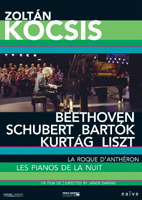Zoltán Kocsis plays
Beethoven Schubert Bartók Kurtág Liszt
Les Pianos de la Nuit à La Roque d’Anthéron 2002
DVD Naïve DR 2100

Live recording
Produced by Idéale Audience Paris
Directed by János Darvas
A remarkable recital by ZOLTÁN KOCSIS
juxtaposes Liszt's nationalist and cryptic late styles (including the Fifth
Hungarian Rhapsody and Csárdás macabre) with
cannily selected miniatures by Bartók (For Children) and
Kurtág (excerpts from Games, dedicated to Kocsis). The Pianist
also bridges Beethoven's transitional, pre-late-period style (the E minor
op. 90 Sonata) with early Schubert (two movements from his own Sonata in
that same key, D566) into Bartók's thorny yet concise three-movement
Sonata. János Darvas's camerawork occasionally lets us glimpse
Kurtág's handwritten score from which Kocsis plays, and captures the
pianist's calm, focused body language, prism-like sonority and elegantly
proportioned phrasing.
Jed Distler
© BBC Music Magazine, November 2003
Beethoven Sonata No.27 in E minor
Schubert Sonata in E minor
Bartók Sonate SZ 80
Bartók For Children SZ 42 Vol.1 (excerpts)
Kurtág Games (excerpts)
Liszt Hungarian Rhapsody No.5 in E minor
Liszt Les Jeux d’eaux à la Villa d’Este
Liszt Sunt Lacrymae Rerum
Liszt Csárdás Macabre
... Beethoven, Schubert, Bartók, three sonatas to start with and no
mistake, three cardinal points to locate the personage who plays impassively,
lip almost sullen, hands knotty, movement calibrated to the millimetre, with
just the flicker of a glance from time to time as if to invite the audience
to savour this or that modulation or to tell it between two pieces the silence
in which he wishes to remain immersed. For the Kurtág, if he has the
music in front of him it is not out of weakness nor from pride in being the
dedicatee of the piece, but simply because, as the piece is open in structure,
he wishes to have all the alternatives in front of his eyes. Yet it was
Kurtág who had only one word – “horrible!” – for
the Bach that Kocsis played him while still a student, not that this stopped
the guilty party carrying off the Franz Liszt prize. It is Liszt from whom
the cameras of János Darvas withdraw, focusing instead on the fingers
of the artist, who from the Hungarian Rhapsody to Jeux d’eau possesses
that most precious art of recreating works before one’s eyes.
Thierry Beauvert
© Idéale Audience 2003
János Darvas Home
Page
TV and Video Productions
with Zoltán Kocsis - Directed by János Darvas
|